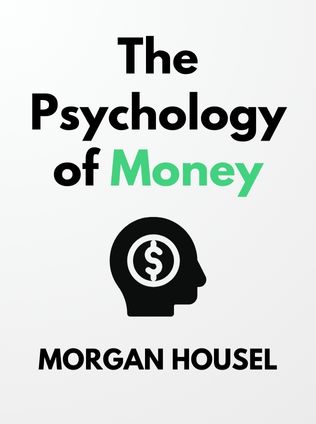
The Psychology of Money
By Morgan Housel
Published 01/2020
About the Author
Morgan Housel, a renowned financial expert and former columnist for The Motley Fool and The Wall Street Journal, brings a unique perspective to the world of finance with his extensive experience and profound understanding of human behavior. His work focuses on the psychological and emotional aspects of money management, helping readers navigate the often complex and irrational world of personal finance. Housel's writing is characterized by its clarity, accessibility, and insightful observations, making complex financial concepts understandable and relatable to a broad audience.
Main Idea
The core premise of "The Psychology of Money" by Morgan Housel is that financial success is less about intelligence and education and more about understanding human behavior. Housel argues that mastering the psychological aspects of money management—such as emotions, biases, and beliefs—is crucial for making better financial decisions. Through a series of lessons and anecdotes, he emphasizes that long-term financial success is rooted in simple, pragmatic approaches rather than complex strategies.
Table of Contents
- Introduction
- Luck and Risk
- Never Enough
- Confounding Compounding
- Getting Wealthy vs. Staying Wealthy
- Freedom
- Man in the Car Paradox
- Wealth is What You Don’t See
- Save Money
- Reasonable > Rational
- Surprise!
- Room for Error
- You’ll Change
- Nothing’s Free
- You & Me
- Seduced by Pessimism
- When You’ll Believe Anything
- All Together Now
- Confessions
Luck and Risk
Housel begins by discussing the often overlooked role of luck and risk in financial success. He uses the example of Bill Gates, who not only possessed intelligence and drive but also benefited from a rare opportunity—access to a computer in the 1960s. This illustrates how chance events can significantly influence outcomes. Housel cautions against the common mistake of trying to replicate the exact paths of successful individuals, noting that their unique circumstances often played a crucial role in their achievements.
"The more exceptional the story, the more likely luck played a bigger role in its outcome." - Morgan Housel
To navigate the uncertainties of life and finance, Housel recommends focusing on patterns of behavior that are consistently successful rather than chasing after outliers whose success may be due to luck.
Never Enough
One of the most critical lessons in the book is the distinction between being rich and being wealthy. Housel explains that wealth is money you don't see—it's the savings and investments that aren't flaunted through material possessions. Being rich, on the other hand, is about high income and visible consumption. The danger lies in the societal pressure to appear rich, which can undermine true wealth-building efforts.
"The hardest financial skill is getting the goalpost to stop moving." - Morgan Housel
Housel emphasizes the importance of setting personal financial goals and being content with "enough" to avoid the perpetual cycle of wanting more, which can lead to risky financial behaviors and dissatisfaction.
Confounding Compounding
Compounding, the process where returns generate more returns over time, is a powerful but often misunderstood concept. Housel points out that the length of time money is invested is more crucial than the rate of return. He illustrates this with the example of Warren Buffett, whose wealth is attributed not just to his high annual returns but to the fact that he started investing at a young age and continued for decades.
"The single most powerful factor of compounding is time." - Morgan Housel
To harness the power of compounding, Housel advises maintaining consistent, long-term investments, which can exponentially grow wealth over time.
Sign up for FREE and get access to 1,400+ books summaries.
You May Also Like
The Subtle Art of Not Giving a F*ck
A Counterintuitive Approach to Living a Good Life
By Mark MansonRich Dad Poor Dad
What the Rich Teach Their Kids About Money - That the Poor and Middle Class Do Not!
By Robert T. KiyosakiHow To Win Friends and Influence People
The All-Time Classic Manual Of People Skills
By Dale CarnegieFreakonomics
A Rogue Economist Explores the Hidden Side of Everything
By Steven D. Levitt and Stephen J. Dubner



















